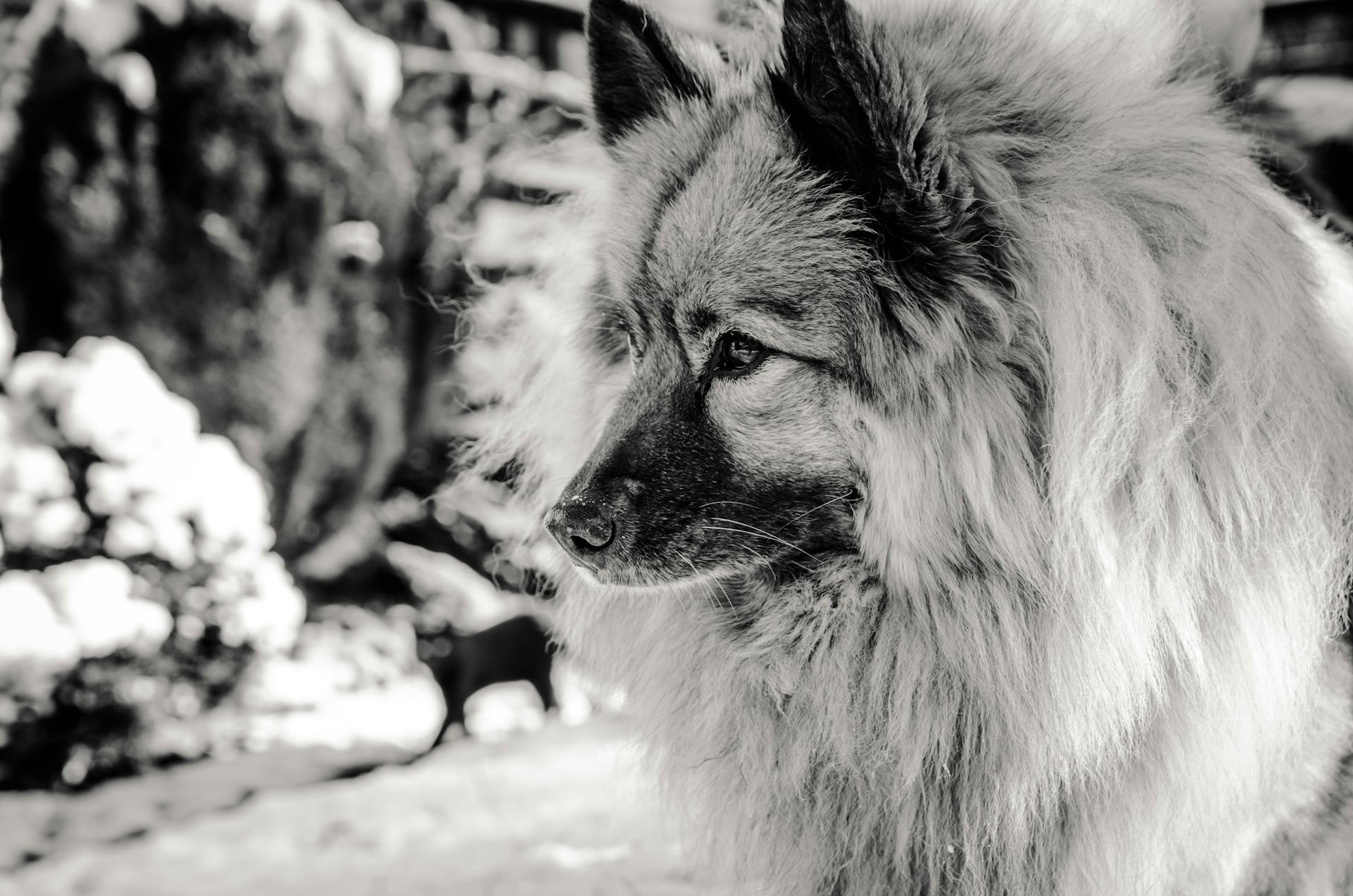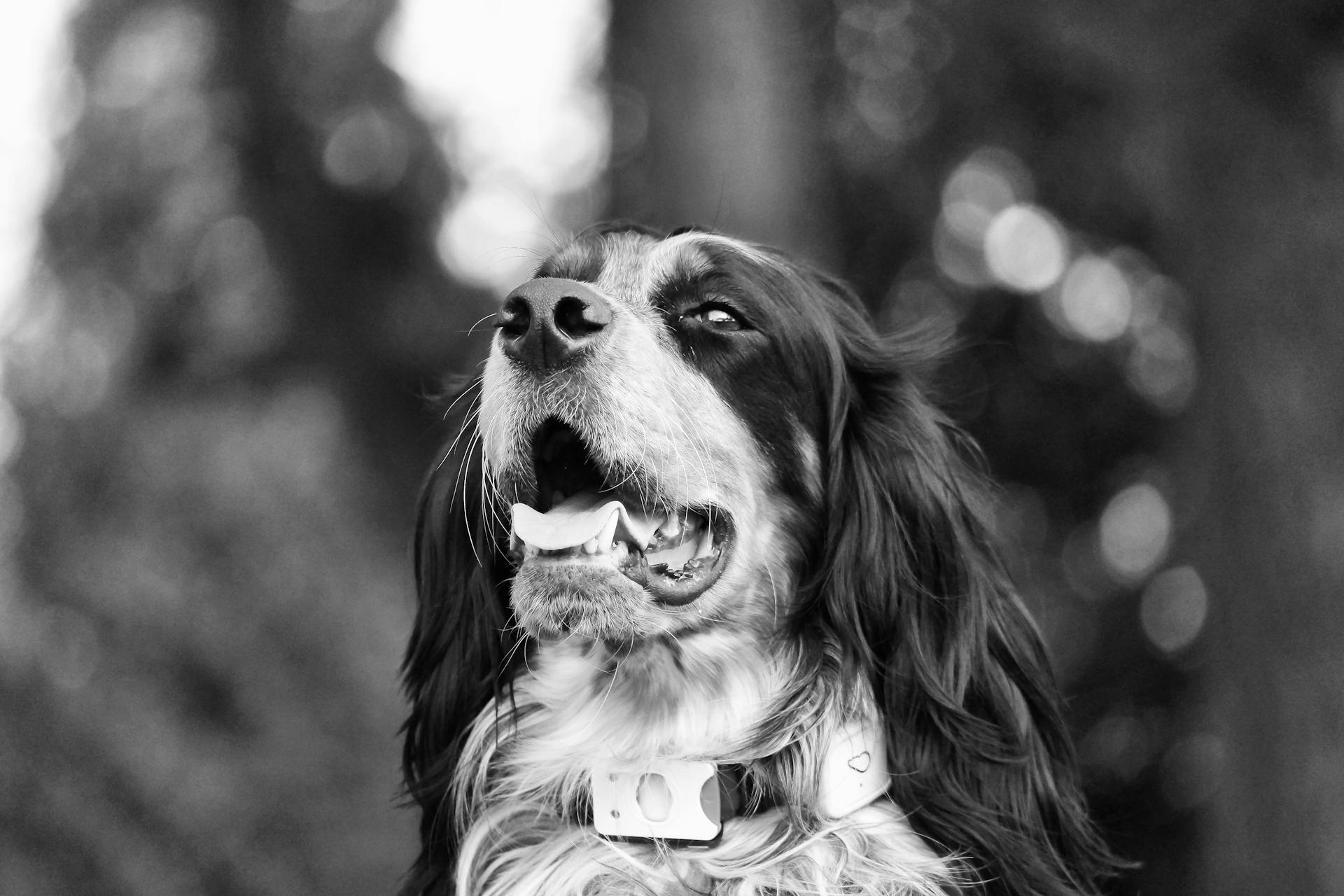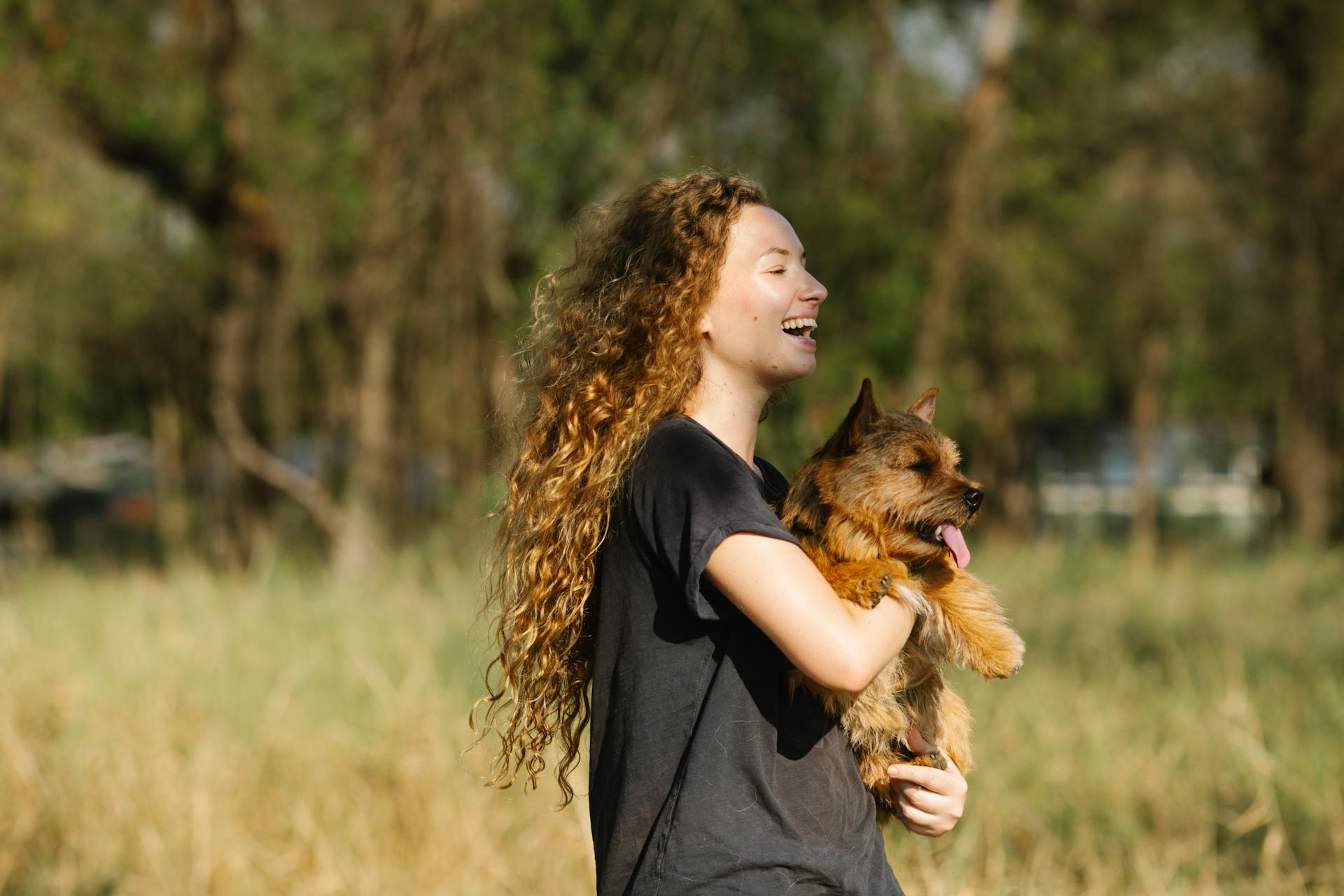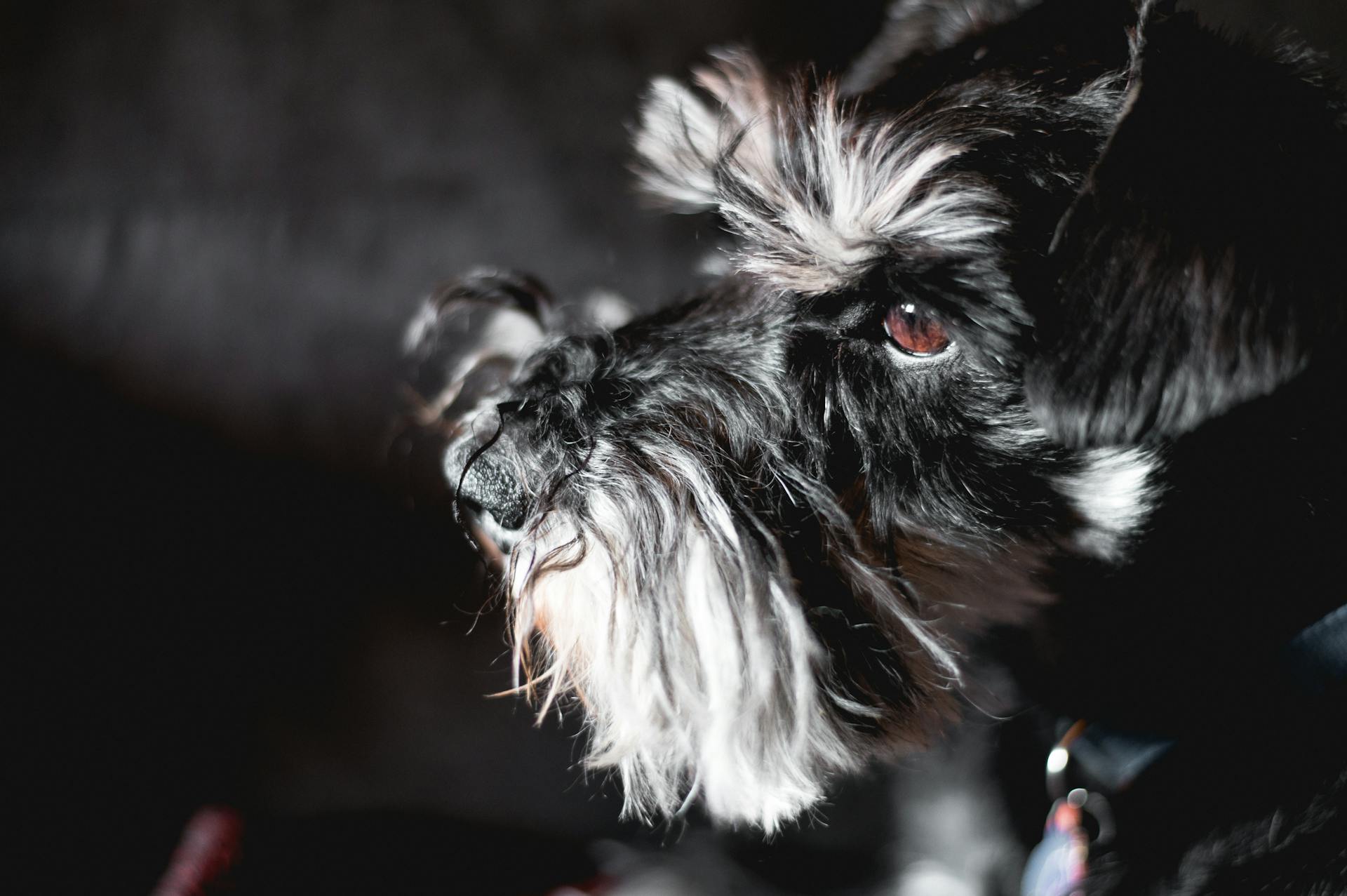
The adult miniature schnauzer is a unique breed that requires attention to their specific needs. They can be wary of strangers, making socialization crucial from an early age.
Their intelligence and trainability make them a great companion for active owners. With regular exercise and mental stimulation, they can thrive in a variety of living situations.
As a relatively small breed, they don't require a huge living space, but they do need regular grooming to prevent matting and tangling of their distinctive beard and mustache.
Family and Temperament
Miniature Schnauzers make excellent family pets due to their good-natured and easy-to-train personalities. They're a great choice for owners with different lifestyles, whether you have young children or live in a household with other adults.
Miniature Schnauzers are smart and spunky dogs who love people, making them fun playmates for kids and other family pets. They're energetic but eager to please their family by following cues and commands.
As a breed, Miniature Schnauzers are very attached to their people and want to be wherever you are at all times. They're loving little dogs who are always ready to play, but children must understand how to play gently with small dogs.
Here are some key temperament traits to consider:
- Playful and good with children
- Bold, watchful, busy and often mischievous
- Tends to be aloof toward strangers
- Can be aggressive toward strange dogs
- Usually gets along with household pets
To keep your Miniature Schnauzer happy, ensure they're given engaging activities throughout the day, as they'll get bored with nothing to do. Food or games are the best rewards for reward-based training, and they're a fast learner, but can be quite headstrong at times.
Personality and Temperament
Schnauzers are known for their excellent family pet potential, making them a great choice for owners with different lifestyles. They're considered easier to train and good-natured, and can make a great companion for owners living in the city or the countryside, and first-time owners too.
Miniature Schnauzers are smart and spunky dogs who love people. They're energetic but eager to please their family by following cues and commands. Well-trained Miniature Schnauzers do well with kids and other family pets, making fun playmates.
A different take: Are German Shepherds Good for First Time Owners
Schnauzers of all sizes come from a working-dog heritage, many enjoy having a job to do. Try enrolling your Miniature Schnauzer in dog sport classes, such as agility or obedience competitions, so he can give his body (and brain!) a workout.
Miniature Schnauzers are very attached to their people and want to be wherever you are at all times. They're loving little dogs who are always ready to play, but children must understand how to play gently with small dogs.
Miniature Schnauzers are generally good with children, but their big personality can sometimes mean they confront larger dogs, and their terrier prey drive may stand in the way of friendships with small animals. They do like to chase.
Miniature Schnauzers bond so strongly with their families that they can be aloof toward new people coming into the home. But as soon as your pup sees you interacting with a stranger, they'll likely be friendly toward the new person, too.
Here are some key traits of Schnauzers:
- Playful and good with children
- Bold, watchful, busy and often mischievous
- Tends to be aloof toward strangers
- Can be aggressive toward strange dogs
- Usually gets along with household pets
- Food or games are the best rewards for reward-based training
- Fast learner, but also bored easily, and can be quite headstrong at times
Appearance
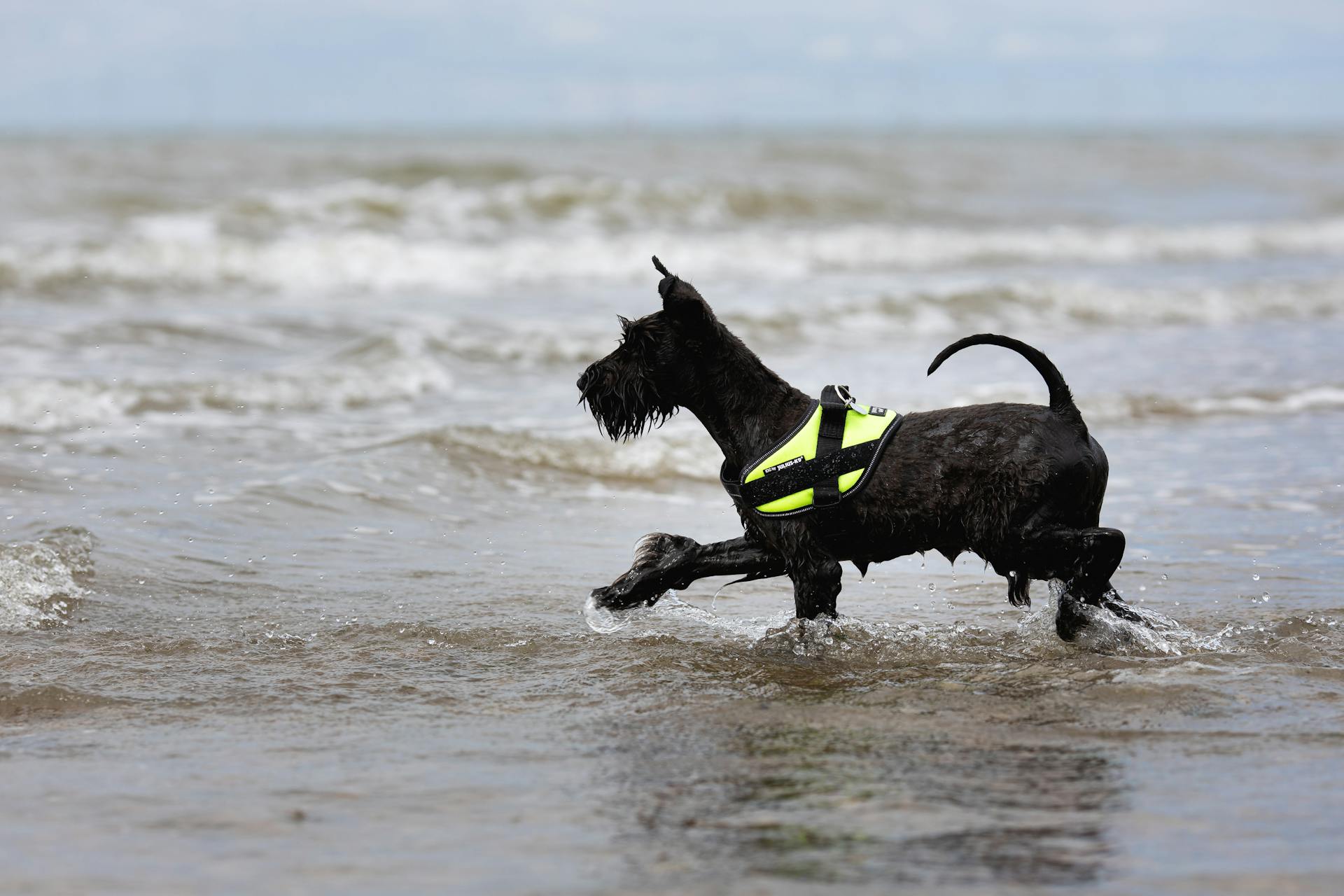
The Miniature Schnauzer's appearance is quite distinctive. Their perky, inquisitive ears and scruffy facial hair make them a lively little dog who's always on the move.
Their ears are small, V-shaped, and lie close to the head when they're not cropped. If you do decide to crop their ears, they'll be pointed and stick up in the air.
Miniature Schnauzers have bright, dark brown eyes that are oval-shaped and deep set. Their nose is solid black, which adds to their adorable expression.
Their coat is a medium-length double coat, consisting of a hard and wiry top coat and a soft undercoat. You can find Miniature Schnauzers in three different color combinations: salt and pepper, black and silver, or solid black.
Their tail is typically docked, but this procedure has been banned in many places due to medical and behavioral concerns. If you're considering docking, it's essential to consult with a veterinarian first.
Health and Care
Miniature Schnauzers are generally healthy dogs, but like any breed, they can be prone to certain health issues. Their lifespan is typically between 12-15 years.
To keep your Miniature Schnauzer healthy, it's essential to provide a proper diet and plenty of exercise. Feeding them a strict low-fat diet can help prevent pancreatitis, a serious condition that requires hospitalization for treatment.
Regular grooming is also crucial for Miniature Schnauzers. They require regular trims to keep their hair healthy and their mustache tidy, and brushing them at least once a week can help reduce tangles and mats.
Here are some common health issues that can affect Miniature Schnauzers:
- Pancreatitis: a serious condition that requires hospitalization for treatment and a strict low-fat diet
- Diabetes Mellitus: often caused by a pre-existing condition, like pancreatitis, obesity, Cushing’s disease or genetics
- Cataracts: can be caused by an inherited condition or secondary to diabetes
- Bladder Stones: often caused by diet or other conditions in the bladder, like a bladder infection
- Portosystemic Shunt: a birth defect that can be treated with diet change, medication, and surgery
- Myotonia: a genetic muscle disorder that can be managed with medications
- Von Willebrand Disease: an inherited disease that can cause bleeding problems
- Mycobacterium Avium Complex (MAC): a rare but lethal defect of the immune system
Health Concerns
Schnauzers are generally a healthy breed, but like all breeds, they can be prone to certain health issues. Pancreatitis is a serious condition that can be caused by eating high-fat foods, and it's recommended to feed your Schnauzer a strict dog food diet to avoid this.
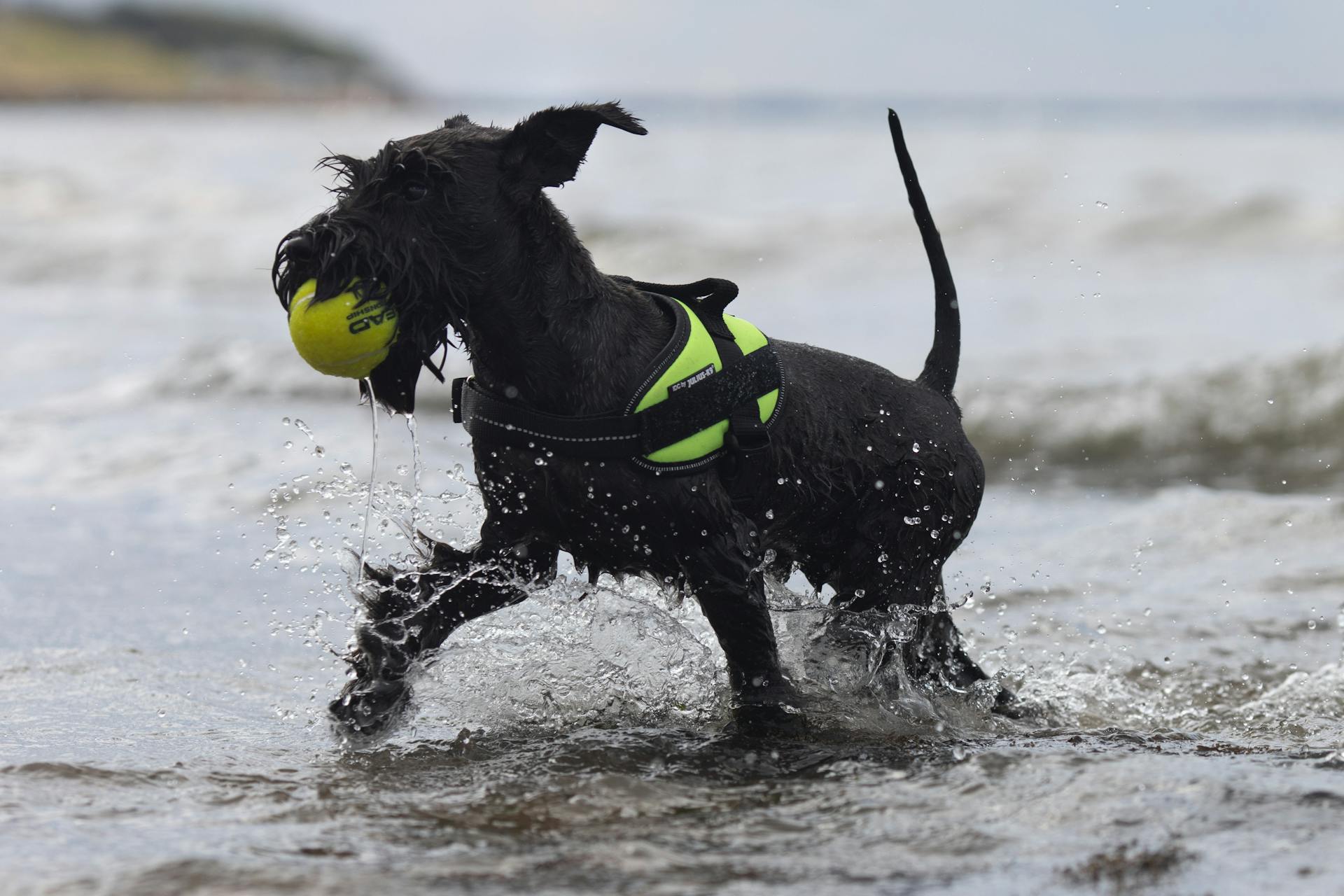
Cataracts are another common issue in Schnauzers, which can cause a cloudy appearance in the eye. This condition can be inherited or secondary to diabetes.
Bladder stones are often caused by diet or bladder infections, and symptoms include urinary accidents, straining to urinate, and blood in the urine.
Miniature Schnauzers are also prone to certain health conditions, including diabetes, portosystemic shunt, myotonia, von Willebrand disease, and mycobacterium avium complex (MAC).
Here are some health concerns to be aware of in Schnauzers:
- Pancreatitis
- Cataracts
- Bladder stones
- Diabetes
- Portosystemic shunt
- Myotonia
- Von Willebrand disease
- Mycobacterium Avium Complex (MAC)
[Caring for]
Caring for a Miniature Schnauzer requires attention to their exercise needs. They need at least an hour of exercise a day, which can include walks, puzzle games, agility, and learning new tricks.
Their double coat requires regular trims to keep their hair healthy and their mustache tidy. Miniature Schnauzers should see a professional groomer at least once every eight weeks.
To keep their coat looking its best, brushing your Schnauzer at least once a week helps reduce tangles and mats. The Schnauzer's signature beard may need more upkeep than the rest of their body.
Miniature Schnauzers crave attention and presence from their family, and shouldn't be left alone to entertain themselves all day. They need to live as a part of their family, going where they go, doing what they do.
Additional reading: When Is National Boston Terrier Day
Health and Care
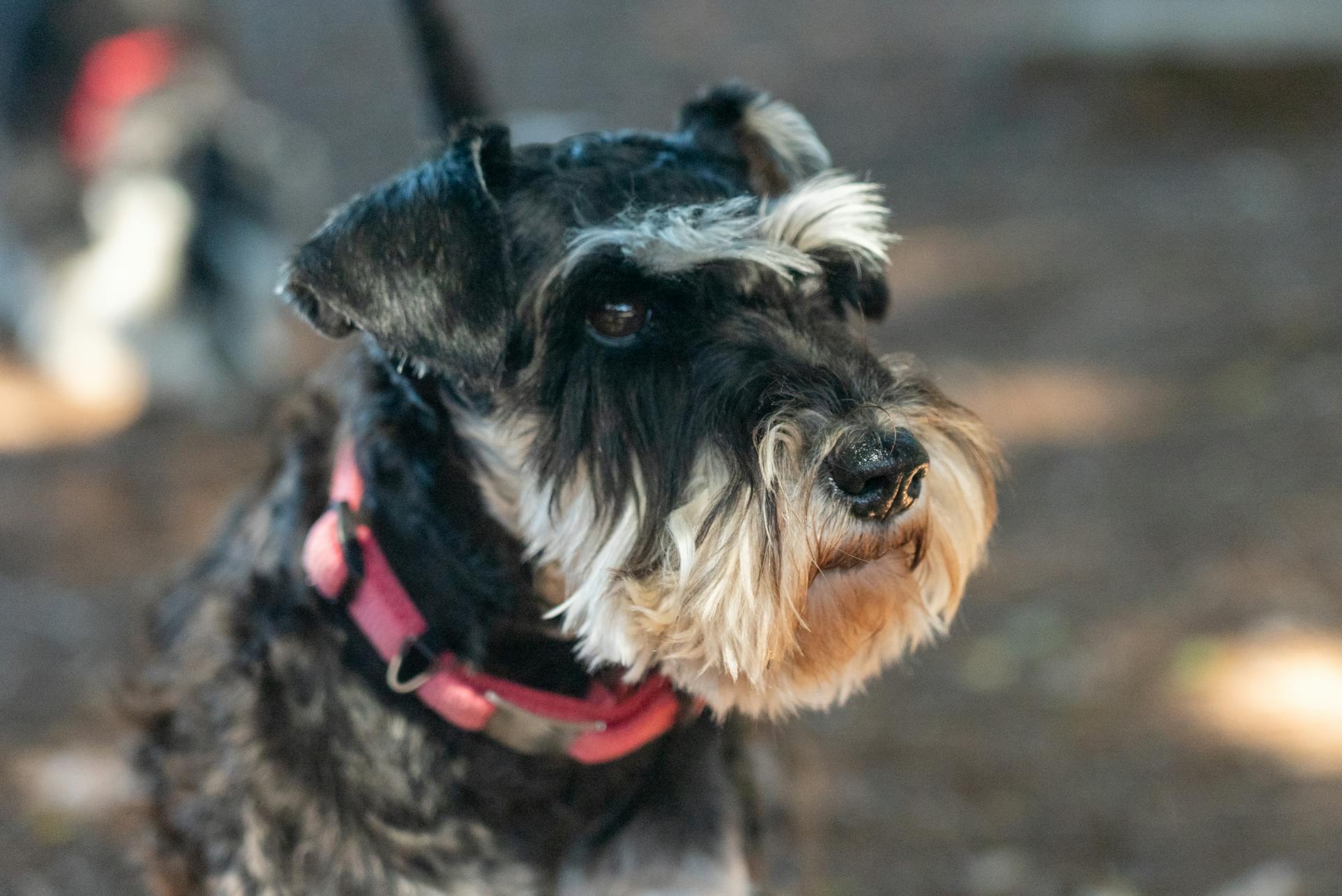
Miniature Schnauzers are sturdy dogs despite their small size, typically reaching 12-14 inches in height and weighing 11-20 pounds.
Genes play a significant role in determining a Miniature Schnauzer's overall weight, and nutrition can also impact their growth, but it's not possible to make a dog bigger or smaller based on what you feed them.
A lack of nutrition can stunt a dog's growth and make them smaller than they would be if fed correctly, so it's essential to provide a balanced diet.
Most Miniature Schnauzers are done growing by a year old, but some may have a final growth spurt that sends them over their expected weight.
You can accurately predict your dog's final adult weight at around four months, but it's also essential to keep an eye on their body condition to determine if they're a healthy weight or not.
Most Miniature Schnauzers will only gain a few pounds during their last few months of growth, and they may appear a bit skinny for a bit, especially if most of their calories seem to go toward height gain and not muscle mass.
You might like: Bernese Mountain Dog 6 Months
Grooming Guide
Grooming your adult Miniature Schnauzer is a big task, but with the right routine, you'll be able to keep them looking and feeling their best.
Their wiry, medium-length coat requires regular grooming, both by you and a professional groomer. You'll need to brush their coat every day with a slicker brush to prevent tangles and mats.
Miniature Schnauzers shed very little, but they do need regular trims to keep their hair healthy and their mustache tidy. They should see a professional groomer at least once every eight weeks.
You'll also need to trim their toenails at least once a month, as you'll know when it's time by the sound of their nails clacking on the floor. Regular nail trimming is essential for your dog's comfort and mobility.
In addition to nail trimming, brushing their teeth every day with dog toothpaste and a dog toothbrush is crucial for their oral health. You should also visit your vet for a professional tooth cleaning once a year.
See what others are reading: Schnauzer Brush
It's essential to check your Miniature Schnauzer's ears every two weeks for debris or excess wax, as the hair growing inside can cause infection if left untended. If you notice anything unusual, speak to your vet right away.
By following this grooming guide, you'll be able to keep your adult Miniature Schnauzer looking and feeling their best. With regular trims, nail trimming, and oral care, you'll be well on your way to becoming a pro at grooming your furry friend.
Frequently Asked Questions
How big do Miniature Schnauzers get?
Miniature Schnauzers typically stand 11-14 inches tall and weigh 10-18 pounds, depending on their sex. Their compact size makes them a great fit for city living or families with small spaces.
What is the life expectancy of a Miniature Schnauzer?
Miniature Schnauzers typically live for 12-14 years, but with proper care, some may live up to 16 years or more.
Sources
- https://www.akc.org/dog-breeds/miniature-schnauzer/
- https://www.countryliving.com/uk/wildlife/dog-breeds/a35694759/schnauzer/
- https://www.petmd.com/dog/breeds/miniature-schnauzer
- https://be.chewy.com/dog-breed/miniature-schnauzer/
- https://spiritdogtraining.com/growth-chart-calculator/miniature-schnauzer/
Featured Images: pexels.com
